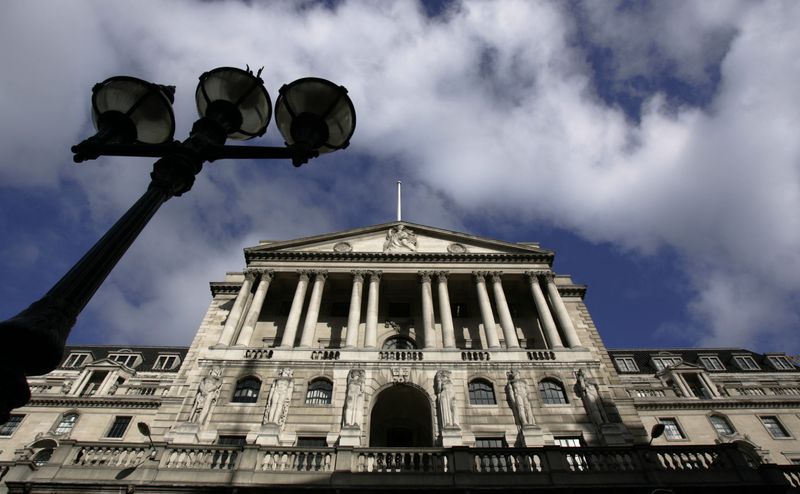By David Milliken
LONDON (Reuters) - Britain's central bank looks on course to raise interest rates next week for the second time in less than two months, reversing more of its COVID-19 pandemic stimulus, after inflation jumped to its highest in nearly 30 years.
Inflation has risen sharply across advanced economies, driven by higher energy prices and supply-chain difficulties. But the Bank of England has moved faster than other big central banks because of fears that costly energy and a tight labour market could see price pressures become entrenched.
Most economists polled by Reuters last week expect the BoE to raise rates to 0.5% on Feb. 3 from 0.25%. On Monday rate futures priced in an 87% chance of such a move.
"They need to do something in the short term to reinforce their credibility, anchor inflation expectations, and perhaps support sterling as well, to improve the inflation outlook," said Samuel Tombs, chief UK economist at consultants Pantheon Macroeconomics.
The BoE has not raised rates at two consecutive Monetary Policy Committee (MPC) meetings since June 2004.
A hike would also set the BoE's 875 billion pounds ($1.18 trillion) of government bond holdings on a downward path as it ceases reinvestment of maturing gilts.
Tombs brought forward his forecast for a BoE rate rise by a month after data last week showed consumer price inflation hit 5.4% in December, its highest since March 1992.
Inflation - which has overshot BoE forecasts over the past six months - is set to peak at more than 6% in April when regulated household energy bills rise by around 50% after the recent gas price surge.
BoE Governor Andrew Bailey said last week that inflation risked being more persistent than the BoE expected in November due to tensions between Russia and Ukraine. Futures markets showed natural gas prices staying higher for longer.
He added that firms were considering raising prices and wages this year in a way that would cause inflation to be too slow to fall back to its 2% target.
"The objective for monetary policy now should be to lean against this 'strong-for-longer' scenario," Catherine Mann, an external member of the MPC, said on Friday.
The other seven MPC members have said nothing publicly on policy this year, and a February rate rise is not definite.
The BoE wrong-footed markets in November when it kept rates on hold, triggering the sharpest weekly fall in bond prices since 2009. Its new chief economist, Huw Pill, later said markets should not expect detailed guidance on policy action.
NEW FORECASTS
The BoE will publish new growth and inflation forecasts on Feb. 3, replacing November ones which were quickly left out of date by higher-than-expected inflation and the Omicron variant.
Economists also want a sense of how much further the BoE thinks rates might rise, and if it might need to take them above 'neutral' to a tightening level.
In November, the BoE downplayed market expectations that rates might reach 1% this year. Now markets expect rates to hit 0.75% - their pre-pandemic level - in May and 1.25% by November.
Britain's wave of Omicron-related COVID-19 cases - which was surging when the BoE raised rates on Dec. 16 - is now less than half the peak of early January.
Economists reckon the financial damage has been mostly limited to sectors such as hospitality, leading to a roughly 0.5% hit to output over December and January.
Gross domestic product returned to its pre-pandemic level for the first time in November.
The job market has performed more strongly than the BoE expected, with unemployment close to pre-pandemic levels although there are around 600,000 fewer people in employment, as some older workers dropped out of the workforce.
This, combined with record-high job vacancies, is fuelling the BoE's concern about labour market pressures. Mann spoke of a potential 'regime change' compared with the 2010s when wage growth was weak, even when inflation spiked above 5% due to an oil price surge in 2011.
"Even though the recovery has not been particularly stellar, it does seem we are starting to hit supply-side constraints a bit sooner than other countries," Pantheon's Tombs said.

Brexit-related frictions and low business investment since the 2016 referendum probably lay behind this, he added, and he doubted that workers' bargaining power had strengthened much.
($1 = 0.7412 pounds)